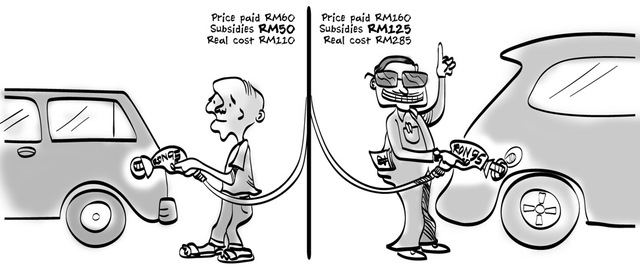
The deputy finance minister, Dato Ahmad Maslan makes a big deal about his subsidy rationalisation initiative. It saves the country RM1.1 billion this year and RM3.3 billion next year. The 1.1 billion saved this year will be spent this year. He went on saying how much the government spends on subsidies. The government spends around RM40bn a year for subsidies and that is a lot of money showing how much the government cares for the people. Out of that, RM24bn is for subsidies of certain fuels and LPG. Imagine if the government withdraws the subsidy – how much can be allocated elsewhere? There was one MP from BN who said, the RM40bn can be used to build 10 RM400m hospitals?
What then is the objective of this much touted subsidy rationalisation? Save money from one item to have it spent on another? Or cut down selected spending to reduce the overall budget deficit?
How much did we overspend last year? The deficit last year was 5% and this year’s its targeted to be 4%. What is the amount of public debt? The public debt currently is around RM519bn and will reach RM546bn by the end of the year. So every savings and cut downs are important. The government has to reduce its spending and regain creditworthiness. Already Fitch Ratings has downgraded Malaysia’s creditworthiness from stable to negative.
My question to him was, if the amount saved from the subsidy is spent elsewhere, where is the saving? The same amount if spent elsewhere constitutes an amount contributing to the overall budget deficit. Similarly, if the next year’s amount saved RM3.3 bn is spent on something else, then it’s not saving. The same amount is injected into the economy causing the overall deficit. Savings occurs if the amount withdrawn is put away, not spent.
If the government intends to spend elsewhere, then the whole exercise ought not to be called subsidy rationalisation. It should be termed optimization of spending. Rather than spending x amount on subsidy, you spend it elsewhere where the benefits from the amount spent is deemed as giving more desired results.
What the government does is take money out from the left pocket and put it into the right pocket.
The other contentious point is the assertion that after a while the government realises that 30% of the people who enjoy the subsidised petrol and diesel are those earning RM3000 below. Although I am uncomfortable with the choice of RM3000 being the chosen benchmark as a measure of poor people- how many people in Malaysia are earning RM3000 a month? Isn’t 40% of the population earning RM1500 and below? Anyway, the government suddenly realises that 70% of the users of diesel and RON95 earn more than 3000 a month, i.e. richer people- the government announces that this can’t do. The richer must be made to pay.
So, the subsidy is withdrawn because we want to stop the rich from enjoying subsidised diesel and ron95. We therefore punish them by raising the price of diesel and ron95? But by doing that, do we not also punish the 30% who are poorer but will now have to bear the punishment on the richer?
What is the objective of the subsidy renationalization? It should not be as the deputy finance minister implied the redeployment of the amount taken off for other uses. Then there will be no savings.
The government should stop hiding behind verbal semantics and obfuscation. If that objective is really to trim spending, look elsewhere for the remedy.
PETRONAS has subsidised IPPs, TNBs and others since 1997 for billions of Ringgit. Sometime ago, the president of PETRONAS lamented of its subsidies on TNB and announces it isn’t going to subsidise gas any longer. Cut down spending on these big budget items. Other big budget items are the mega projects. MRT, LRT extension etc.
The office of the PM spends around RM 14 billion a year. Cut it to half. The permata project and other child development programs cots is RM1.2 billion.
Cut it by half. Cut down the repatriation of money by foreign workers. The Bangladeshis, Indonesians, Nepalese and others remit around RM20billion a year. The illegal workers who number the validated workers remit another RM20billion. Clamp the illicit outflow of funds that has amounted to more than RM1 trillion over the last decade. There are so many other big budget items other than the 40bn subsidies.
Posted by sakmongkol AK47



No comments:
Post a Comment
Note: Only a member of this blog may post a comment.